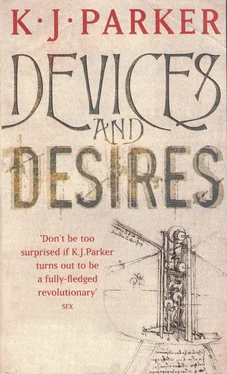K Parker - Devices and Desires
Здесь есть возможность читать онлайн «K Parker - Devices and Desires» весь текст электронной книги совершенно бесплатно (целиком полную версию без сокращений). В некоторых случаях можно слушать аудио, скачать через торрент в формате fb2 и присутствует краткое содержание. Жанр: Фэнтези, на английском языке. Описание произведения, (предисловие) а так же отзывы посетителей доступны на портале библиотеки ЛибКат.
- Название:Devices and Desires
- Автор:
- Жанр:
- Год:неизвестен
- ISBN:нет данных
- Рейтинг книги:3 / 5. Голосов: 1
-
Избранное:Добавить в избранное
- Отзывы:
-
Ваша оценка:
- 60
- 1
- 2
- 3
- 4
- 5
Devices and Desires: краткое содержание, описание и аннотация
Предлагаем к чтению аннотацию, описание, краткое содержание или предисловие (зависит от того, что написал сам автор книги «Devices and Desires»). Если вы не нашли необходимую информацию о книге — напишите в комментариях, мы постараемся отыскать её.
Devices and Desires — читать онлайн бесплатно полную книгу (весь текст) целиком
Ниже представлен текст книги, разбитый по страницам. Система сохранения места последней прочитанной страницы, позволяет с удобством читать онлайн бесплатно книгу «Devices and Desires», без необходимости каждый раз заново искать на чём Вы остановились. Поставьте закладку, и сможете в любой момент перейти на страницу, на которой закончили чтение.
Интервал:
Закладка:
He was in the back yard; and all the back yards of all the factories in the world are more or less identical. The pile of rusting iron scrap might be a foot or so to the left or right; the old tar-barrel full of stagnant rainwater might be in the north-east corner rather than the north-west; the chunky, derelict machine overgrown with brambles might be a brake, a punch, a roller or a shear. The important things, however, are always the same. The big shed with the double doors is always the main workshop. The long shed at right angles to it is always the materials store. The kennel wedged in the corner furthest from the gate is always the office. The tiny hutch in the opposite corner is always the latrine, and you can always be sure of finding it in the dark by the smell.
Ziani ducked behind the scrap pile and quickly took his bearings. Ninth Avenue ran due south, so the gate he'd just climbed over faced east. He glanced up at the sky; it was grey and overcast, but a faint glow seeping through the cloud betrayed the sun, told him it was mid-afternoon. In all factories everywhere, in mid-afternoon the materials store is always deserted. He looked round just in case; nobody to be seen. He scuttled across the yard as fast as he could go.
The geometry of stores is another absolute constant. On the racks that ran its length were the mandatory twenty-foot lengths of various sizes and profiles of iron and brass bar, rod, strip, tube, plate and sheet. Above them was the timber, planked and unplanked, rough and planed. Against the back wall stood the barrels and boxes, arranged in order of size; iron rivets (long, medium and short, fifteen different widths), copper rivets, long nails, medium nails, short nails, tacks, pins, split pins, washers; drill bits, taps, dies; mills and reamers, long and short series, in increments of one sixty-fourth of an inch; jigs and forms, dogs and faceplates, punches, callipers, rules, squares, scribers, vee-blocks and belts, tool-boats and gauges, broaches and seventeen different weights of ball-peen hammers. At the far end, against the back wall, stood the big shear, bolted to a massive oak bench; three swage-blocks, a grinding-wheel in its bath, two freestanding leg-vices, a pail of grimy water and a three-hundredweight double-bick anvil on a stump. Every surface was slick with oil and filmed with a coating of black dust.
It was the familiarity of it all that cut into him; he'd worked all his life in places like this, but he'd never looked at them; just as, after a while, a blind man can walk round his house without tripping, because he knows where everything is. All his life Ziani had worked hard, anxious to impress and be promoted, until he'd achieved what he most wanted-foreman of the machine room of the Mezentine state ordnance factory, the greatest honour a working engineer could ever attain this side of heaven. Outside Mezentia there was nothing like this; the Guilds had seen to that. The Eternal Republic had an absolute monopoly on precision engineering; which meant, in practice, that outside the city, in the vast, uncharted world that existed only to buy the products of Mezentine industry, there were no foundries or machine-shops, no lathes or mills or shapers or planers or gang-drills or surface-grinders; the pinnacle of the metalworker's art was a square stub of iron set in a baked earth floor for an anvil, a goatskin bellows and three hammers. That was how the Republic wanted it to be; and, to keep it that way, there was an absolute prohibition on skilled men leaving the city. Not that any Mezentine in his right mind would want to; but wicked kings of distant, barbarous kingdoms had been known to addle men's minds with vast bribes, luring them away with their heads full of secrets. To deal with such contingencies, the Republic had the Travellers' Company, whose job it was to track down renegades and kill them, as quickly and efficiently as possible. By their efforts, all those clever heads were returned to the city, usually within the week, with their secrets still in place but without their bodies, to be exhibited on pikes above Travellers' Arch as a reassurance to all loyal citizens.
Ziani walked over to the anvil and sat down. The more he thought about it, of course, the worse it got. He couldn't stay in the city-this time tomorrow, they'd be singing out his description in every square, factory and exchange in town-but he couldn't leave and go somewhere else, because it simply wasn't possible to leave unless you went out through one of the seven gates. Even supposing he managed it, by growing wings or perfecting an invisibility charm, there was nowhere he could go. Of course, he'd never get across the plains and the marshes alive; if he did, and made it as far as the mountains, and got through one of the heavily guarded passes without being eaten by bears or shot by sentries, a brown-skinned, black-haired Mezentine couldn't fail to be noticed among the tribes of pale-skinned, yellow-haired savages who lived there. The tribal chiefs knew what happened to anyone foolish enough to harbour renegades. Silly of him; he'd jumped out of check into checkmate, all the while thinking he was getting away.
On the bench beside him he saw a scrap of paper. It was a rough sketch of a mechanism-power source, transmission, crankshaft, flywheel; a few lines and squiggles with a charcoal stub, someone thinking on paper. One glance was enough for him to be able to understand it, as easily as if the squiggles and lines had been letters forming words. Outside the city walls, of course, it'd be meaningless, just hieroglyphics. A mechanism, a machine someone was planning to build in order to achieve an objective. He thought about that. A waterwheel or a treadmill or a windlass turns; that motion is translated into other kinds of motion, circular into linear, horizontal into vertical, by means of artfully shaped components, and when the process is complete one action is turned into something completely different, as if by alchemy. The barbarians, believers in witchcraft and sorcery, never conceived of anything as magical as that.
He thought for a while, lining up components and processes in his mind. Then he slid off the bench, washed his hands and face in the slack-tub and headed across the yard to the office.
As he walked in, a clerk perched on a high stool turned to peer at him.
'Any work going?' Ziani asked.
The clerk looked at him. 'Depends on what you can do,' he said.
'Not much. Well, I can fetch and carry, sweep floors and stuff.'
'Guild member?'
Ziani shook his head. 'Left school when I was twelve,' he said.
The clerk grinned. 'Good answer,' he said. 'We're all right for skilled men, but we can always use another porter.' He shook his head. 'Crazy, isn't it? There's Guildsmen sat at home idle for want of a place, and the likes of you can walk in off the street and start immediately.'
'Good,' Ziani said. 'What's the pay?'
The clerk frowned. 'Don't push your luck,' he said.
Nice clear directions brought Ziani to the shipping bay. The factory made farm machinery-ploughs, chain and disc harrows, seed drills-for export to the breadbasket countries in the far south. How they got there, very few people knew or cared; the Mezentines sold them to dealers, who took delivery at Lonazep, on the mouth of the estuary. Ziani had never been to Lonazep, but he knew it was outside the walls. After five hours lifting things on to carts, he was asked if he fancied volunteering for carriage duty.
The answer to this question, in every factory in the world, is always no. Carriage duty means sitting on the box of a cart bumping along rutted tracks in the savage wilderness outside the city. It pays time and a half, which isn't nearly enough for the trauma of being Outside; you sleep in a ditch or under the cart, and there are rumoured to be spiders whose bite makes your leg swell up like a pumpkin.
Читать дальшеИнтервал:
Закладка:
Похожие книги на «Devices and Desires»
Представляем Вашему вниманию похожие книги на «Devices and Desires» списком для выбора. Мы отобрали схожую по названию и смыслу литературу в надежде предоставить читателям больше вариантов отыскать новые, интересные, ещё непрочитанные произведения.
Обсуждение, отзывы о книге «Devices and Desires» и просто собственные мнения читателей. Оставьте ваши комментарии, напишите, что Вы думаете о произведении, его смысле или главных героях. Укажите что конкретно понравилось, а что нет, и почему Вы так считаете.












